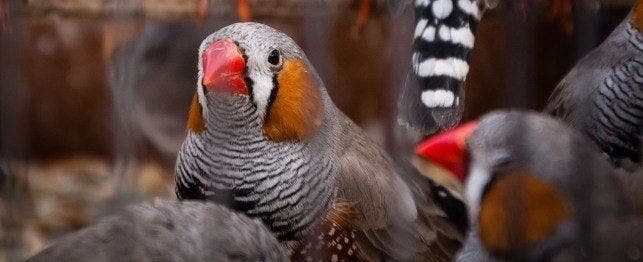
Selecting a Bird
After much consideration, you have finally decided that a bird would fit perfectly into your life. Now, you just need to decide which one to choose. With so many species available, making a decision can be challenging. Remember, birds can live for many years so you need to be prepared to care for your pet for quite a while. By educating yourself before your purchase, you can increase your chances of selecting the perfect species.
Here are some popular bird breeds:
Society finches. The beautiful plumage, quirky song and antics of society finches have made them one of the world’s most popular finches. They are easy to maintain, hardy and well suited to any home environment. They require little space, although, like all birds, they enjoy having space to fly.
Canaries. One of the most endearing qualities of these birds is their beautiful song. Males are the best singers – and they usually sing better when kept alone. Canaries make good pets for just about anyone, but they are especially appealing to older people.
Lovebirds. These lovely little birds are known as lovebirds because of the strong pair bond between mates that continually sit together preening, cooing and billing. They are hardy and easy to care for.
Budgie. Budgies can be taught to talk, although not all will. Some will only whistle, while others will learn many words. Hand-raised birds are more likely to talk as are single-caged birds. Relatively inexpensive, they are not loud, do not take up a lot of space and do not make a mess.
Cockatiel. Cockatiels, with their sweet dispositions, soft voices and graceful appearance, make ideal pets for people of all ages. They can be taught to speak in soft, squeaky voices, but their main vocal talent is whistling and they quickly learn to mimic tunes. Males have a courtship song they sing while doing a shuffling dance to win their chosen hen.
Sulphur-crested cockatoo. Greater sulphur-crested cockatoos are affectionate, playful and highly intelligent birds. They are excellent companion birds for those who want a charming, loving bird. Greater sulphur-cresteds tend to be very demanding of attention. If they are deprived of attention can become very noisy and destructive or turn to plucking or self-mutilation behavior.
Blue and gold macaw. Blue and gold macaws (Ara ararauna) are prized for their beauty and personality. They make excellent pets, although some have a tendency to become nippy. Young, hand-raised macaws are very adaptable and easily handled by many people.
Moluccan cockatoo. Moluccan cockatoos are highly intelligent birds that make excellent pets: Charming and affectionate, they love to cuddle. The problem with all this devotion is that they demand attention back – big time. And, if they don’t get it, they can turn destructive and annoyingly noisy.
Scarlet macaw. Scarlet macaws are prized for their beauty and personality. Lively and intelligent, they are easy to train, which makes them a favorite choice for people who want a bird that will readily pick up on games and tricks.
Yellow-headed Amazon. He is, in no uncertain terms, a ham. While many birds like attention and interaction, this one just plain loves to show off. The African grey is probably a more capable talker, but no bird is more enthusiastic. Yellow heads are quick to greet visitors, flaring their tails and flashing their eyes with excitement when addressed.
Grand eclectus. Eclectus are short, stocky birds with square tails, and are unique among parrots in that their striking plumage color immediately sets one sex apart from another. The females of the species are deep scarlet to bright red with black beaks and blue patches; males are brilliant green with yellow-orange beaks.
Blue-fronted Amazon. Of all the Amazons, blue-fronts have the most difference in colors. They talk, but not usually as well as yellow-napes or yellow-heads. They are intelligent, inquisitive birds but are sometimes shy.
Congo African grey. African greys are often considered to be the best talkers of all parrots, rivaled only by some Amazons. They are gifted mimics, reproducing sounds such as ringing telephones, microwave buzzers, car horns and the voices of individuals. Some are highly trained birds, capable of reasoning and verbal communication.